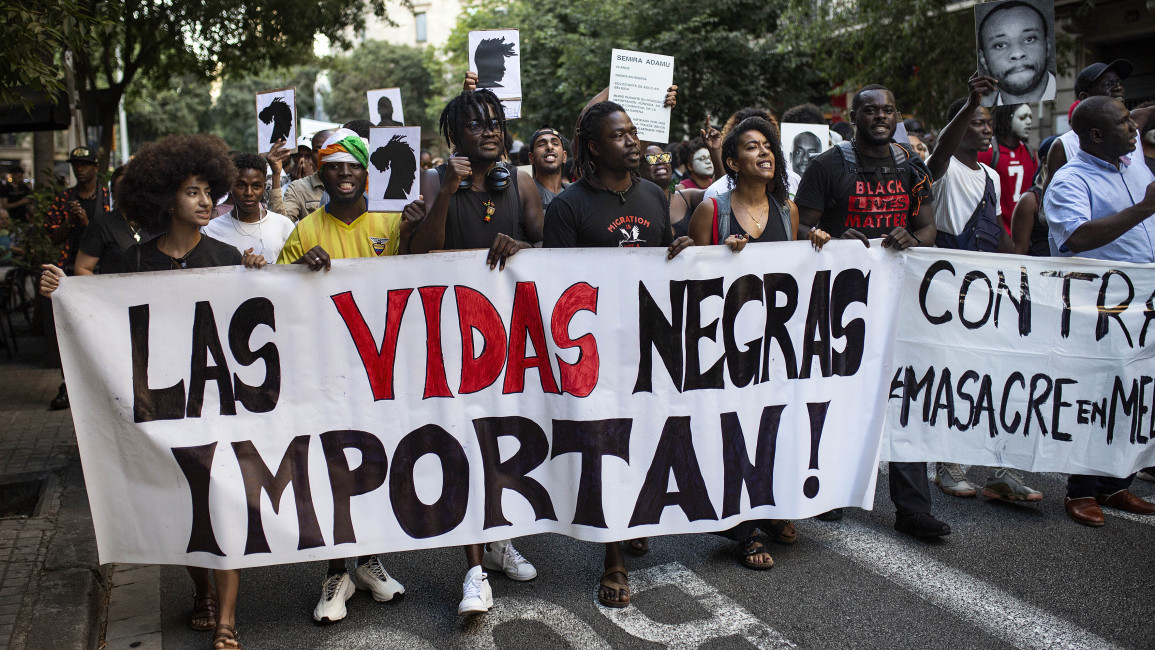Amid Moroccan authorities' silence, AMDH resorts to Facebook in search of Melilla massacre's missing migrants
More than two weeks have passed since the "Melilla massacre" and dozens of migrants remain missing.
In midst of the Moroccan authorities' silence and lack of follow-up on the incident, the Moroccan Association of Human Rights (AMDH) has begun to resort to social media platforms in an attempt to find the missing migrants, hopefully alive.
"We tried to contact the hospital of Nador to verify some images we received of suspected dead migrants. They refused to collaborate saying this information is related to the interior ministry," Mohammed Amin Abidar, head of AMDH Nador, told The New Arab.
"Everything about that day [of the massacre] is obscure," he added.
On Friday 24 June, around 2,000 migrants attempted to cross from Morocco's Nador to the Spain-controlled enclave of Melilla. Moroccan and Spanish forces allegedly killed at least 23 migrants and injured dozens during the incident.
"This is a Sudanese young man named Mohammed Salah, one of the missing migrants on the massacre of Friday 24 June in Nador. Please whoever has information about him, call us so we can inform his family," the association shared on Facebook with a picture of Mohammed Salah.
Scrolling down on the association's Facebook page, the list expands to fifty-eight missing person cases, the comments on the posts either expresses empathy or claims to have information about the missing.
"Desperate families [of migrants] call us or reach us through Facebook wondering if their children are alive or dead," Abidar noted to The New Arab.
Abidar says many of those missing may be alive, but located as far as 800 kilometres from the site of the massacre: Nador.
Following the Black Friday events, Moroccan authorities displaced dozens of migrants, many of them injured, to small Moroccan cities far from the fences and Beni Mellal and Jerrada.
"They took many of them in buses and threw them in far away cities," explained Abidar.
The Moroccan government says only 23 migrants died during the Melilla events.
The Spanish NGO Caminando Fronteras has raised the death toll to 40, after finding out that two migrants have died in the border town of Oujda, East of Morocco.
The Spanish NGO says the Moroccan gendarmerie had taken the two migrants 140 kilometres far from Nador, despite being seriously injured. They were asylum seekers from South Sudan, a country torn by conflict.
The Melilla massacre is the first immigration crisis on the Moroccan Spanish borders since the two countries ended their one-year-long diplomatic stalemate in March and heralded a new stage of cooperation.
In a written petition, AMDH flagged the new Spanish-Moroccan migration policy as a "cooperation of deadly nature." More than 40 Moroccan and Spanish NGOs have signed the petition.
After an international backlash, Madrid and Rabat said they launched a collaborative investigation. So far, Rabat's officials have shielded behind silence, blaming mainly "humantraficking rings" for the massacre.
Morocco's council of human rights is expected to publish the results of its investigation on Wednesday.
AMDH is expected to publish its official report on July 20.
For its part, Spain's Council for the Elimination of Racial or Ethnic Discrimination (CEDRE) called on Monday for the revision of migration agreements with Morocco.
After expressing its "strongest condemnation" of what occurred in Melilla, CEDRES said, "the use of force must always be guided by the principle of proportionality and respect for human rights."
"If a given country is not able to respect these basic principles, it cannot be an integral part of a migration control agreement with Spain," insisted the body
The dispute inside Sanchez's coalition started in March, when the socialist leader shifted Spain's long-standing neutrality policy on Western Sahara, backing Morocco’s autonomy plan in the disputed territory.
The Melilla massacre exacerbated the conflict as the socialist leader chose once again to stand by Morocco, as he sticks with the "Rabat version" on what happened in Melilla.
Sanchez had said that Morocco handled the situation "well" during the Melilla events. But he soon backtracked, saying he was not aware of the videos that pictured the horrendous brutality against migrants on the day of the massacre.
However, he continues to stand by the importance of Morocco's role in securing the Madrid and Rabat borders.
For their part, Unidas Podemos, the left-leaning party in coalition with Sanchez's party, has voiced its condemnation of the Melilla massacre, calling out Sanchez for his pro-Morocco position.
"We do not need a leader of the agreement with Morocco, but a leader president who is proud to save lives in the Mediterranean", said Jaume Asens, the leader of the group of deputies of Unidas-Podemos, at Tuesday's parliamentary session.
Asens was referring to Pedro Sanchez’s decision in 2018, two weeks after winning the PM position, to host 629 migrants from the humanitarian ship Aquarius.



